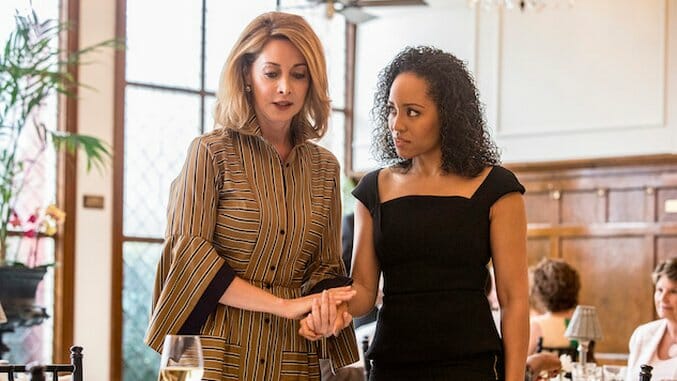Biracial Blues and New Chapters in Queen Sugar’s Midseason Premiere
(Episode 2.09)
Photo by Patti Peret © 2017 Warner Bros. Entertainment Inc / Courtesy of OWN TV Reviews Queen Sugar
When we left the Bordelons in the midseason finale, they were all at a crossroads in their personal lives. Charley (Dawn-Lyen Gardner) confessed her feelings to Remy (Dondre Whitfield), but their blossoming interest in one another has been met with complications. Nova (Rutina Wesley) found companionship in her colleague, Dr. Robert DuBois (Alimi Ballard), after a series of one-night stands to mend her breakup with Calvin; Ralph Angel (Kofi Siriboe) proposed to his girlfriend, Darla (Bianca Lawson).
In the midseason premiere “Yet Do I Marvel,” written by Jason Wilburn and directed by Julie Dash (Daughters of the Dust), new beginnings collide with the unearthing of past hurt. After receiving a text from Aunt Vi (Tina Lifford), Charley sees that her divorce to Davis (Timon Kyle Durrett) has gone public. She is now a free woman, news she shares with Remy when he stops by, and he takes advantage of her freedom to ask her out on a date. In this moment, their undeniable chemistry is on full display.
Remy: You and me tonight. Gumbo up to your elbows and I promise you, so good it’ll make you holler.
Charley: You wanna make me holler, huh?
We see the two of them strolling in the rain together under an umbrella like new lovers, laughing, kissing and soaking up being together—until bliss is interrupted with an unexpected call from Charley’s mother. She’s here in St. Josephine to see her. When she comes face-to-face with her mother Loran Prescott (Sharon Lawrence), a stunning blonde, blue-eyed woman of sophistication, she is embraced and critiqued. We see the woman who Nova credits making Charley into a “control freak.” Charley’s energy around her mother is tense—she straightens and braces herself as if she doesn’t want to teeter outside of her mother’s expectations of her. Throughout the episode, the relationship between a white mother and her biracial daughter is shown in little moments. The way Lorna touched Charley’s natural curls, saying, “Your hair is so beautiful” and Charley, to her surprise, responding, “I didn’t think you’d like it.”
But Lorna’s tendency to micromanage and share her brutal honesty about Charley’s life from the way she lives, her new look, and trading negotiating million-dollar contracts for athletes to run a sugar mill in Louisiana. She questions her moves: “Choice or reaction?”
Charley: Mom, I’m the first black woman to own a mill in the state. That’s not small scale.
Lorna: My question is, will you be satisfied with this?
In contrast, the topic of family for Darla is quietly burdening her with the absence of her parents after her engagement to Ralph Angel. When their son, Blue (Ethan Hutchinson), asks about them for his family tree, her wheels visibly turn at the mention of them. Even later, when they share the news with Hollywood (Omar Dorsey) and Aunt Vi—who says, “I can’t wait to meet your folks, Darla”—her quiet reaction suggests that her past as a drug addict (and sex worker, to finance her habit) has caused a deep rift with her family. She carries their rejection and avoidance of her as she’s working to overcome her addiction and mending the damage it has caused. In the middle of her surprise engagement celebration, Darla takes that time to reach out to them, leaving a sincere voicemail to her parents. You can feel her trying to hold her composure as she mentions the good in her life as a token to reconnect with them.
“I want you to know that I’m good… and I miss you and I love you.” —Darla
The most compelling moment in the episode unearths Charley’s experience as a biracial woman who navigated the worlds of California and Louisiana. Deeply affected when her son, Micah (Nicholas Ashe), shares the horrible details of his arrest with her, the conversation she has with her mother is refreshing to see, as she expresses that she failed to prepare her black son for life in the South. Lorna says that she was aware that she was raising “a black woman in a white world” and made sure she had “the best education and the best pedigree.” Charley’s summers in St. Josephine with her father were meant to connect her with her blackness, but Charley says frankly that it only complicated her identity—that her blackness felt like a mask she had to wear when necessary.
Charley: I know you don’t understand that.
Lorna: Why?
Charley: Because you can’t understand that.
Lorna: Because I’m white? Is that what you’re trying to say? Well, I did the best by you and that is what any mother does for their child.
For Gardner, playing a character like Charley helps to explore her strengths and “the part of her that also needs to be taken care of, and heard, and vulnerable,” she says. As Charley cries in her mother’s arms, we see the woman behind the armor and humanize the woman who once had it all.
Ashley G. Terrell is a freelance entertainment writer based in Michigan. Her work has appeared in Ebony Magazine, The Huffington Post, Black Girl Nerds, and more. She is currently working on her first novel and is the creator of the blog, The Carefree Black Girl Chronicles of ASHLEMONADE. You can follow her on Twitter.